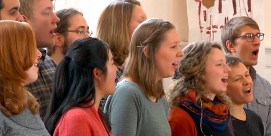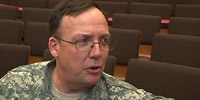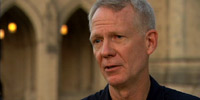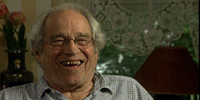In This Episode << SLIDE LEFT TO SEE ADDITIONAL SEGMENTS
Recollections of William Sloane Coffin
Read recollections of William Sloane Coffin by the Rev. Thomas B. Chittick, Lutheran campus minister at Yale in the 1970s. He was interviewed by phone from Maine, where he is the pastor at Trinity Lutheran Church in Westbrook.
I started campus ministry at Yale in 1970 … and was received by a lot of people there with great graciousness — Hillel people, Thomas More people, but chief in that was Bill Coffin. He wanted some of the denominational campus ministers to be associate pastors at Battell Chapel, which meant that I was always there Sunday mornings. I would do an early Lutheran Eucharist and dash across the Old Campus, go down the aisle for the great procession with the great choir and great organ (Charles Krigbaum was the university organist then). Occasionally we would do some part of the service, the prayers, maybe a reading, but it was more about presence and contact and that sort of thing. Battell was also a parish of the United Church of Christ. There would be services when school was not in session, and that’s when some of the rest of us would also get the chance to preach occasionally. What I appreciated was Bill’s hospitality and his particular model of how to do chapel work and chaplaincy at a school like that. People came there both to do denominational work and then to be “on loan” to the university in an ecclesial way.
Battell in those days, along with the divinity school, had a place at the center of the table of the university in a way I think is not as true anymore. It was a grand place for the exchange of ideas, certainly in the religious mode, and chief in that was Bill’s preaching. I hadn’t the foggiest notion of how to preach out of the Old Testament with the kind of verve that we certainly were trained to have for preaching out of the New Testament. Bill could make the characters in the Hebrew Bible be as alive as I think Lutheran seminaries can help us make either Paul or characters in a parable seem alive. Part of it had to do with his Niebuhrian training and that idea of “Christ transforming culture” — therefore his ability to look at the characters in the Old Testament, many of whom, especially the prophets, were dealing with Hebrew nationhood and Hebrew governance and the machinations of kings and peoples and foreign countries. The war was raging in Vietnam at the time, so his ability to use these ancient texts to say a contemporary word to where we all were then was just extraordinary. It’s not only that he could apply something that David said to the contemporary scene paradigmatically or intellectually or ideologically. He could make David come alive at the same time so that it was flesh-and-blood people speaking. That was delightful for me.

We would meet as pastors of Battell every week, and we’d even pick out the hymns together. Bill’s attention to detail was delightful. He wasn’t simply the prophet on the road; he also had a strong pastoral and, in his own way, liturgical sensibility. When the assignments would go around, and we’d lead what we called the prayer of the faithful or community prayer, he’d often want [associate pastor] Sam Slie to do it, because unlike the rest of us, Sam was not interested in pretty words. It was just meat and potatoes. Not that we didn’t pray, all of us, for those issues, but Sam didn’t dress it up, and Bill loved that.
Bill’s care for the older people in the congregation was something you could sense. He was not only chaplain to the nation and chaplain to a university and certainly a magnet preacher for a lot of folks at the time, he could also pay attention to the details of most people for whom Battell was their parish. I am aware, also, of his doing some small but consistent amount of pastoral counseling to students.
One of the things that Bill modeled for me was his capacity to talk about Jesus, and to talk about Jesus in something more nearly like the public square. Bill was preaching in a church, but he knew full well that he wasn’t just addressing Christians when he spoke from Battell’s pulpit. … Clearly he was a Christian minister, and he was putting Jesus out as a model, but he was doing it in such a way that a Jew or an agnostic or a Buddhist could listen in on the power of what was being said and not be distracted by the claims of people who want somehow to own Jesus, denominationally or religiously. He saw Jesus in bigger terms and could put it out there and therefore keep the discussion going, rather than shut it off or close it down. That is a legacy for ecumenism, because too often we are going for the lowest common denominator, and Bill didn’t do that. He wouldn’t satisfy the “orthodoxists” in his presentation of Jesus, but aside from that it was pretty powerful stuff.
Bill got into any number of public discussions and debates, but preaching was his forum, at least at Yale, and he had humor. Just at the point that he would very nearly bedazzle you with his capacity at winding two strands together, the ancient story and the contemporary story, and you would nearly be blinded by the light of it all, he’d flick in some humor or maybe even some of his own anger. It brought it back home a little bit. There were people who would take notes. I knew divinity school students who could tell me, not only the next week but much later, even later into their careers, “Bill once said … ,” and they had it written down. He had that ability to turn a phrase. If you were to study classical oratory, like those who can tell you how several of Lincoln’s speeches conform to the ancient pattern of Greek rhetoric, Bill had a rhetorical style that often would flame out at you at the end of an idea that he was trying to put forward. It revolved on usually two lines, with the second line being the inversion of the first. But it was done with a certain poetic flair so it would be memorable. It had a certain piercing quality to it. It would bring your soul to its feet saying, “Oh!” He preached with passion, and he used all this emotion. … Words mean a lot, and sometimes their meaning rests in their brevity, or their meaning comes through brevity and through how you work them, how you make them work, how you attend to them. Bill attended to them.
If you look at H. Richard Niebuhr’s book CHRIST AND CULTURE, he talks about five or six definitions of different relationships of Christ to culture. Lutherans are usually interested in the Christ of culture, whereas Calvinists are about Christ the transformer of culture — the insights of Scripture and of Jesus trying to break through how the civic realm worked to the more pure, more noble, more just. Lutherans, with their attention to the sinfulness of all things, are more inclined at their best to engage in the sinfulness in some fashion, to get their hands absolutely dirty and at some level take it as it is, whereas Calvinists want actually to change the order, to transform it in some fashion. Bill was a Calvinist, so his preaching often would have to do with not simply inviting us to get involved in the messiness of things, but labeling the messiness and saying there are paradigms from the Scripture that we can rely on to suggest alterations of the system.
I think about Bill’s joy of living. What I’m grateful for is that I have known him a little bit up close, and the fiery orator known closer to be a person of such exuberance and joy is different from the fiery orator who is just mad. It’s interesting I would put it that way, because he often would say, “Never trust a happy revolutionary.” Why? Because the things that you want to change and the anger that you bring to a situation cause pain. You hurt people. He knew that some of what he did, the changes that he wanted to be a part of — if the changes themselves weren’t hurting people, people were hurting in any event. It’s not a happy thing, so don’t be happy in the sense of, “I’m glad I’m a part of the revolution. Isn’t this fun?” But conversely and paradoxically, at the same time he was a person of immense fun. He could sit down at the piano and just rattle those ivories something fierce.
I think he respected the university in a deep, deep way and took it seriously as one of the “orders of creation,” to use Lutheran words. He knew that his role there as chaplain was to be the person to speak truth to power. But he didn’t do it as an outsider to the power circles. He was clearly an insider, but he understood at the same time he was an insider only as a prophet is an insider. So it was a strange balance there that he was able to keep. Some people get on the inside and lap it up. He was on the inside because he could speak truth to power, because they knew him and he knew his stuff. He did his homework. He could speak within the academic world with considerable authority. He was on the inside, but he wasn’t on the inside in terms of what his calling was. He brought that other voice. But whether inside or out, he had enormous respect for the academic institution. He knew it was flawed, but he took where he was planted so seriously. I’m thinking of the great convert to Catholicism, John Henry Newman, and his essay on the idea of a university, and Jaroslav Pelikan’s reexamination of that. There are not a lot of people around who think that sort of thing. For crying out loud, it’s a business anymore, and students are clients and consumers, and if not the students then their parents. It was a privilege to go to school, whether you went to Yale or the University of Maine, and you went there with that sense. I think the people who served best also felt that.
Read recollections of William Sloane Coffin by the Rev. Philip Zaeder, associate university chaplain at Yale in the 1970s and former chaplain and dean of the faculty at Phillips Academy in Andover, Massachusetts.
My acquaintance with Bill Coffin began almost 50 years ago in a room at Yale College. He did not so much occupy as fill a room, his speech touching even the most skeptical of listeners. In the fall of 1955, in the old Dwight Hall library, dimly lit and unpretentious, our group of naïve, hesitant Presbyterians awaited their new divinity school advisor. Bill entered and spoke to us with passion, his words wise and compassionate, filled with cadence and humor. He talked of love as a witness in ways I had not imagined or conceived. With the bracing candor of a Socratic sojourner, he asked whether we are loved because we are worthy, or worthy because we are loved. We are loved because God first loved us, Bill reminded us.
Twelve years later, I shared rooms with Bill in Durfee Hall at Yale as his associate in the chaplaincy. During those years in the 1970s, I watched him fill his office, Battell Chapel, press conferences, walkways, even once the New Haven Green, as the Vietnam War, the trial of Black Panther Bobby Seale, May Day events, and the Hunger Action project demanded his time and received his strength and wisdom. I learned firsthand his capacity for turns of phrase, an almost psalmlike gift to find urgency and truth in language. “Dogma is a signpost, not a hitching post,” he would tell his chapel audience, and more recently, “Truth is above harmony. Those who fear disorder more than injustice invariably produce more of both. … If faith puts us on the road, hope keeps us there.” A Yale professor once said of Bill, “We expect him eventually to mellow.” An unfulfilled prophecy. (Warren Goldstein’s recent biography, WILLIAM SLOANE COFFIN, JR.: A HOLY IMPATIENCE, published by Yale University Press, is a testimony to Bill’s far-reaching ministry and soul-filled character, an etching framed by the lines of turmoil and pain, joy and accomplishment.)

Bill had an inspired touch. Chopin came from the keys of his piano. A child, cradled in his arms, was touched by his pastor’s baptismal hand. He gently held candles in vigils, clasped his fingers, like Millet’s farmers, in prayer. I learned how deftly his hand could direct a squash shot to the corner (“Your day for character-building, Phil,” he would say) and felt the breathtaking power of his Russian bear hug in the passing of the peace.
Bill’s voice could rise and fall with the rhythms of a singer and move with the authority of a biblical prophet. And what a voice: it would boom and rasp with an accent all its own and give tongue to Russian, French, Spanish, and German, to Yiddish jokes, Vermont tales, and pithy street humor. “We love our enemies,” he would say, “not by countenancing their sins but by remembering our own. It is the only way to avoid self-righteousness that is the bane of both interpersonal and international problems.” When a minor stroke forced Bill to find his voice again, he would tell his listeners, “I will say only one thing about my voice, akin to what Mark Twain said of Wagner’s music: it must be better than it sounds.” It does sound good and right. It kindles lives and hearts and afflicts the comfortable while bringing, time and again, comfort to the grieving and to those longing for truth.
Bill has the ability to bring light into dark corners of our lives and historical times and to lift our spirits in prayer. His own spirit seems stretched by God’s majesty, yet grounded in the Holy Spirit. The holy becomes for him not a theological abstraction, but the impetus for life and love. In a prayer once for Dr. Howard Koh, he began: “Almighty God, who has created a world beautiful beyond any singing of it, yet one which is filled with rebuffs and heartaches and the mysteries of sickness and death, pour out thy blessing on this healer, thy servant Howard.” In an invocation at a Battell Chapel service in the early ’70s, he prayed: “O God, who hast scattered in the sky stars greater in number than the inhabitants of this earth, and yet art one to whom we turn as to a father, thou who hast given us minds and bodies and spirits, and with whom we can walk and talk, sing and laugh, and learn that giving is taking and love is all in all, how can we speak and not of Thee? Who but Thee deserves our love?”
At the heart of Bill’s world, I imagine, lies the astonishing, life-giving power of the Holy Spirit: a world beautiful in the making, a creation groaning to be full. He could say, like Gerard Manley Hopkins, that the world “is charged with the grandeur of God.” The poet wonders why men do not reckon with God but instead blur the world with trade and turmoil; Hopkins concludes with thought akin to Bill’s vision:
And for all this, nature is never spent;
There lives the dearest freshness deep down things;
And though the last lights off the black West went
Oh, morning, at the brown brink eastward, springs —
Because the Holy Ghost over the bent
World broods with warm breast and with ah! bright wings.
In a sermon years ago, Bill preached on Jesus’ phrase, “Do not be anxious about your life” from the Sermon on the Mount: “If the world does not give us what we want, God gives us what we need (and probably really want anyway). We shall have what our faith expects … namely freedom, a thumb-nosing independence from all the powers of death militant that want to do us in.” Bill then went on to quote Isaiah 40:
Have you not known? Have you not heard?
The Lord is the everlasting God, the Creator of the ends of the earth.
He does not faint or grow weary. … He gives strength to the weary,
and to them who have no might he increases strength.
Even youths shall faint and grow weary …
But they that wait upon the Lord shall renew their strength,
They shall mount up with wings like eagles,
They shall run and not be weary,
They shall walk and not faint.
As Bill once wrote, “I love the recklessness of faith. First you leap, and then you grow wings.”
![]()







